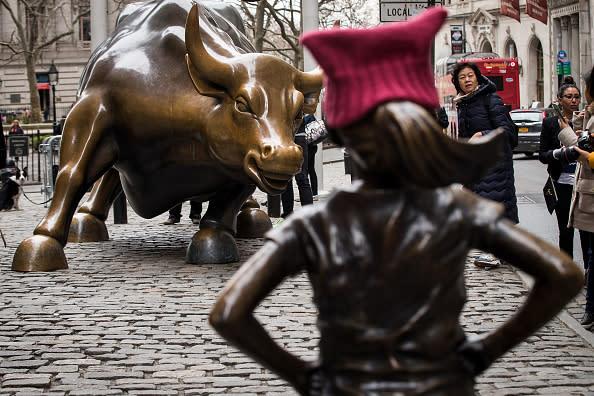US economy: Investors encouraged as drop in Treasury yields helps curb inflation

Wall Street roared higher again on Thursday with hopes that the Federal Reserve may finally be done with its market-rattling hikes to interest rates.
The S&P 500 leaped 1.9 per cent for its fourth straight winning day. It is already up 4.9 per cent this week and on pace for its best week in nearly a year.
The Dow Jones Industrial Average jumped 564 points, or 1.7 per cent, and the Nasdaq composite climbed 1.8 per cent.
Stocks around the world rallied after the Federal Reserve opted against raising its main interest rate late on Wednesday.
It has already jacked up rates furiously since early last year in hopes of slowing the economy and hurting financial markets enough to starve high inflation of its fuel.
More importantly for financial markets, investors also took comments by the Fed’s chair to mean that recent jumps in longer-term Treasury yields were acting like rate-hike substitutes and could obviate the need for more increases by the Fed.
Longer-term Treasury yields fell as Fed chair Jerome Powell spoke following the central bank’s decision, and they kept sinking on Thursday.
The yield on the 10-year Treasury dropped to 4.67 per cent from 4.74 per cent late Wednesday and from more than 5 per cent last week, when it reached its highest level since 2007.
Lower yields provide oxygen across financial markets. They make it easier for businesses and households to get loans, encourage investors to pay higher prices for stocks and reduce the pressure on the entire financial system.
Of course, the recent drop in yields could end up shooting Wall Street in the foot.
Powell said that a run higher in Treasury yields could displace the need for another rate hike if it is “persistent”.
If the 10-year yield ends up falling too far, that could make the Federal Reserve more nervous and encourage more rate hikes.
“That was an interesting nuance, but I don’t think it overrides the majority of his comments that suggested it’s more likely than not that the Fed is done hiking,” said Lon Erickson, portfolio manager at Thornburg Investment Management.
Hopes for no more Fed hikes had financial markets around the world ebullient. Stock indexes jumped 1.8 per cent in South Korea, 1.1 per cent in Japan, 1.5 per cent in Germany and 1.8 per cent in France.
Some reports on the US economy also showed a bit of momentum that could help ease the pressure on high inflation.
Fed officials are waiting to collect enough such data before they say they are comfortable rates are high enough to sustainably drive inflation back down to their 2 per cent target.
One preliminary report Thursday said US businesses produced more stuff during the summer than the number of hours worked increased, indicating they got more efficient.
Such gains in productivity could ease pressure on inflation while helping the economy to grow.
Productivity looks like it may be set for a continued uptrend over the next two years, aided in part by adoption of artificial-intelligence technology, according to economists at Deutsche Bank.
A separate report, meanwhile, said slightly more US workers applied for unemployment benefits last week than expected.
That is bad news for those workers, but a cooler job market could take pressure off inflation.
Big US companies, meanwhile, continue to report better profits for the summer than analysts expected.
Eli Lilly was one of the strongest forces pushing the S&P 500 upward after it reported stronger profit and revenue than analysts estimated.
Its stock rose 4.7 per cent after it said it benefited from soaring sales for its blockbuster diabetes treatment, Mounjaro, which is widely used for weight loss.
Starbucks jumped 9.5 per cent after reporting stronger profit and revenue for the latest quarter than Wall Street forecast. It benefited from customers buying more and paying higher prices.
Also on Thursday, Cedar Fair and Six Flags said they will merge to create an expansive amusement park operator with operations spread across 17 US states and three countries.
Their stocks were mixed, but both remain up more than 7 per cent this week after rumours of the deal spread.
On the losing end of Wall Street was Moderna, which sank 6.5 per cent after reporting a much worse loss for the latest quarter than analysts expected.
All told, the S&P 500 rose 79.92 points to 4,317.78. The Dow jumped 564.50 to 33,838,08, and the Nasdaq gained 232.72 to 13,294.19.
More swings could be coming for Wall Street. On Friday morning, the latest monthly update on the US jobs market will arrive. Economists expect it to show a slowdown in hiring for October.
A remarkably resilient job market has helped to keep the economy out of a long-predicted recession, but the fear at the Fed is too much strength there could push upward on inflation.

 Yahoo Finance
Yahoo Finance 